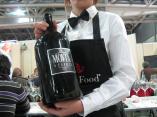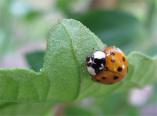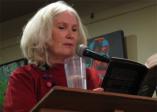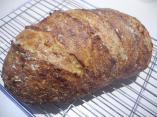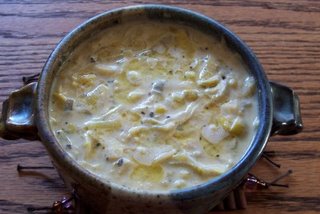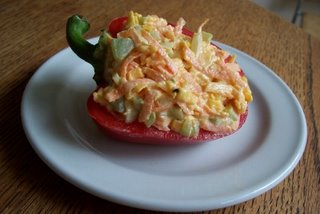I have a pair of rhubarb plants that despite my neglectful stewardship manage to rouse themselves every year to give me a couple of batches of fruit. Not enough to do too much with, but at the very least I like stewed rhubarb: it is transformed with a bit of grated orange zest and the juice of half or a quarter of an orange. And sugar of course. Nice with plain yogurt for breakfast. If you have lots on hand, try a rhubarb custard pie sometime: my my my my my but it’s good. More orange zest called for there, and maybe a dollop of nice vanilla ice cream if the pie is still warm when you get to it.
My cousin Shirley had an old newspaper recipe for Rhubarb Marmalade which sounds a lot like one I had a few years ago and still dream about, and which kindly expects that you may not have an abundance growing in your garden when the mood strikes.
2 oranges
2 lb frozen rhubarb
1/2 cup water
3-1/2 cups sugar
1 cup golden raisins
Cut oranges in half lengthwise. Place them cut side down and slice paper thin, discarding seeds. Cut slices in half, and put them with rhubarb and water in a large saucepan. Bring to the boil, turn down to medium and boil 10 minutes, stirring often. Add sugar and cook slowly until thick, about 20 minutes. Stir often. Add raisins and boil 1 minute. Ladle into hot sterilized jars and seal. Makes about 48 ounces.
The February 2006 issue of Poetry Magazine surfaced during a night table re-engineering exercise, and I read The Bowl of Diogenes, an entertaining article about poetry criticism by William Logan, who sits on both sides of the critical fence.
“In most arts… there is a guild rule against writing criticism. One looks in vain for the ballet reviews of Twyla Tharp and the film reviews of Angelina Jolie. In poetry, as in few other arts (fiction is a partial exception), the critics are the artists themselves — even though many poets, and wise poets they are, have sworn an oath of omerta, never to breathe a word of criticism against a fellow of the guild.”
He explains his position and his passion for crossing over anyway:
“I turned to criticism myself, not out of a messianic instinct or the will to martyrdom, but out of the terrible knowledge that I was a better reader when I read for hire, that I read more intently when driven by necessity.
…criticism has forced me to read books I would otherwise have ignored. I’ve read far more contemporary poetry than most people, and far more than I would have if left to my own devices. I’ve probably read more dreary and ordinary books of verse than is healthy… Yet, on a rare occasion, I’ve felt like Balboa staring out across an unknown sea or Herschel seeing Uranus swim before his telescope… I’ve found a book that reminds me, not just why I write criticism, but why I write poetry.”
He argues firmly against accessibility as the primary goal of contemporary poetry:
“There are, even now, publishers and readers and even poets who think poetry far too obscure, who think poetry ought to be so simple it hardly needs to be read at all… The best poetry has often been difficult, has often been so obscure that readers have fought passionately over it…
For two centuries, well-meaning vandals have been trying to dumb down Shakespeare, wanting to make him common enough for the common reader, in the doltish belief that, introduced to poetry this way, the common reader will turn to the original. Yet the reader almost never does. He’s satisfied with a poor simulacrum of poetry, never realizing that Shakespeare without the poetry isn’t Shakespeare at all. The beauty of poetry is in the difficulty, in the refusal of the words to make the plain sense immediately plain, in the dark magic and profound mistrust of words themselves…
Surely we read poetry because it gives us a sense of the depths of language, meaning nudging meaning, then darting away, down to the unfathomed and muddy bottom. Critics, generations of critics, have devoted themselves to revealing how those words work, to showing that each sense depends on other senses. Not every poem has to be as devious and shimmering as Shakespeare (there is room for plain speaking, too); but the best poetry depends on the subtlety and suggestiveness of its language. If we demand that poetry be so plain that plain readers can drink it the whole plain day, we will have lost whatever makes poetry poetry.”


